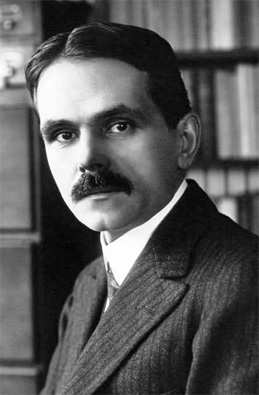| Profile | Major Works | Resources |
Michel-Auguste-Adolphe Landry, 1874-1956.

French Historicist, economist and politician, notable for his contributions to population theory and the concept of the "demographic transition".
Of an old Corsican family, Adolphe Landry was born in Ajaccio and raised in Nimes. Landry was educated at the École normale supérieure (ENS) in Paris, and in 1901 submitted a socialist-tinged doctoral thesis on private property. For the next few years, Landry was a teacher at Toulouse and the Collège Chaptal in Paris. During this period, captivated by the Austrian School, .Landry wrote a notable 1904 treatise restating Bohm-Bawerk's theory of capital in terms of time preference.
In 1907, Adolphe Landry was appointed to the chair in the history of economic doctrines at the École Pratique des Hautes Études, which he would retain (with brief interruptions) for the rest of his career. Adolphe Landry also maintained a parallel political career. He was elected to the French parliament as a deputy for Corsica in 1910, and remained in politics down to his retirement in 1946.
Adolphe Landry is chiefly remembered as for his theory of demographic transition. In an article in 1909, Landry reviewing population theories of past economists - notably Joseph Townsend and Richard Cantillon. Landry identified the theories were not contradictory but applied successively at different historical stages of economic development. In his works on demographic transition (1909, 1934), Landry identified three phases of fertility. In the first phase (the "Townsend phase"), birth rates are biologically-determined, natural and unconstrained, the population size kept in check by mortality and population growth rates determined primarily by fluctuating death rates. In the second phase (the Cantillon phase), birth rates are economically-determined, in that people seeking to maintain a standard of living consciously decide to postpone marriage until they can afford it, and thus there are longer periods of celibacy, reducing overall fertility and slowing down population growth. The third stage emerges when people, aspiring to improve their standard of living, deliberately decide to limit their family size within marriage. For Landry, this third stage is most worrisome for replication is not even guaranteed, and it can induce a population decline. He used the term "demographic revolution" (the title for his 1934 collection of essays).
From 1910, Landry was a founder and activist of various associations to promote large families and population growth, which took a particularly urgent turn after WWI. Landry would serve as a minister in various governments of the Third Republic. Most notable is perhaps his tenure as Ministre du Travail in 1931-32, where he was responsible for introducing family and social policies to encourage large families and demographic recovery.
|
Major Works of Adolphe Landry
|
|
HET
|
|
Resources on Adolphe Landry
|
All rights reserved, Gonçalo L. Fonseca
